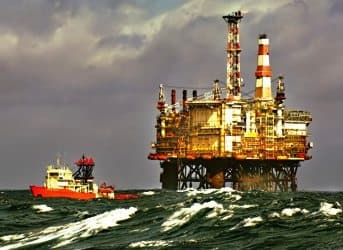British oil production from its offshore North Sea oil fields began in 1975, alongside Norway.
The two countries pursued very different policies as regards investing the cash windfall – to be blunt, the UK spent its money like a drunken sailor, whilst the Kingdom of Norway carefully shepherded its cash into its sovereign wealth fund, the Statens pensjonsfond – Utland, SPU (“Government Pension Fund – Global”) currently worth around $750 billion. Such fiscal caution has allowed Norway to corral roughly .75 percent of world equity, an impressive stake in the global economy from a nation of five million, and is reckoned to be the largest owner of stock in Europe.
As a result, Norwegians now enjoy the fourth highest gross domestic product per-capita in the world, with Norway ranking as the second wealthiest country in the world in monetary value, with the largest capital reserve per capita of any nation and net external creditor of debt, according to the U.S. Central Intelligence Agency. Export revenues from oil and gas have risen to almost 50 percent of total exports and constitute more than 20 percent of the GDP. Norway is the world’s fifth largest oil exporter and third largest natural gas exporter, but it is not a member of OPEC.
Related article: China’s Oil Demand Set to Fall as Environment Finally comes before Economy
But, back to Britain’s portion of the North Sea.
According to the authoritative U.S. government’s Energy Information Administration, “The United Kingdom is the largest producer of oil and the second-largest producer of natural gas in the European Union. Following years of exports of both fuels, the UK became a net importer of natural gas and crude oil in 2004 and 2005, respectively. Although aggressive targets for renewable energy are in place, oil remains important to the UK energy balance, with oil contributing 38 percent of total energy consumption. Recent increases in tax rates for the oil and gas sector, coupled with technical issues, have contributed to sharp declines in UK oil production. Higher tax rates have made the UK fields less competitive, which were already strained by high operating and decommissioning costs. Although a number of new fields are expected to come online in 2013, UK production will continue to decline as new production will not be sufficient to offset the declines. Once a major exporter of oil, the UK exports have dropped in tandem with decreasing domestic production.”
But all is not yet lost. As the major UK North Sea energy producers such as BP PLC and Royal Dutch Shell PLC prepare to abandon the North Sea for more profitable climes, a number of smaller production firms are scrambling for a place at the table.
Given the reality that the oil majors such as BP PLC and Royal Dutch Shell PLC are now abandoning North Sea oil operations for larger profits elsewhere, smaller oil companies are now pressuring London for a chance to operate in the North Sea, previously locked in by the “big boys.” The have made a case to Westminster that the UK portion of the North Sea still retains up to $500 billion of recoverable oil. Bolstering their case, the small producers argue that they lack the infrastructure to get their oil to market and consequently need access to platform hubs and pipelines owned and operated by the big oil companies. By 2025, they argue, over half of existing North Sea infrastructure will be decommissioned or no longer operational.
Related article: Is Canada's Oil Charm Offensive Yesterday's News?
What next?
The U.K. government has just commissioned an independent six-month review of North Sea oil and natural gas to try and resolve these issues, but, for the moment, the major producers hold London’s attention.
First Energy Capital managing director at research Stephane Foucaud tartly observed, “It’s more of a headache than anything else. “They (oil majors) want to exit the North Sea, so dealing with small offtake agreements is not a priority.”
“Small offtake” or not, London is facing a cash crunch, so perhaps it is time to look at the North Sea energy producer wannabees, now that the major producers have left the banqueting table.
By. John C.K. Daly of Oilprice.com


















